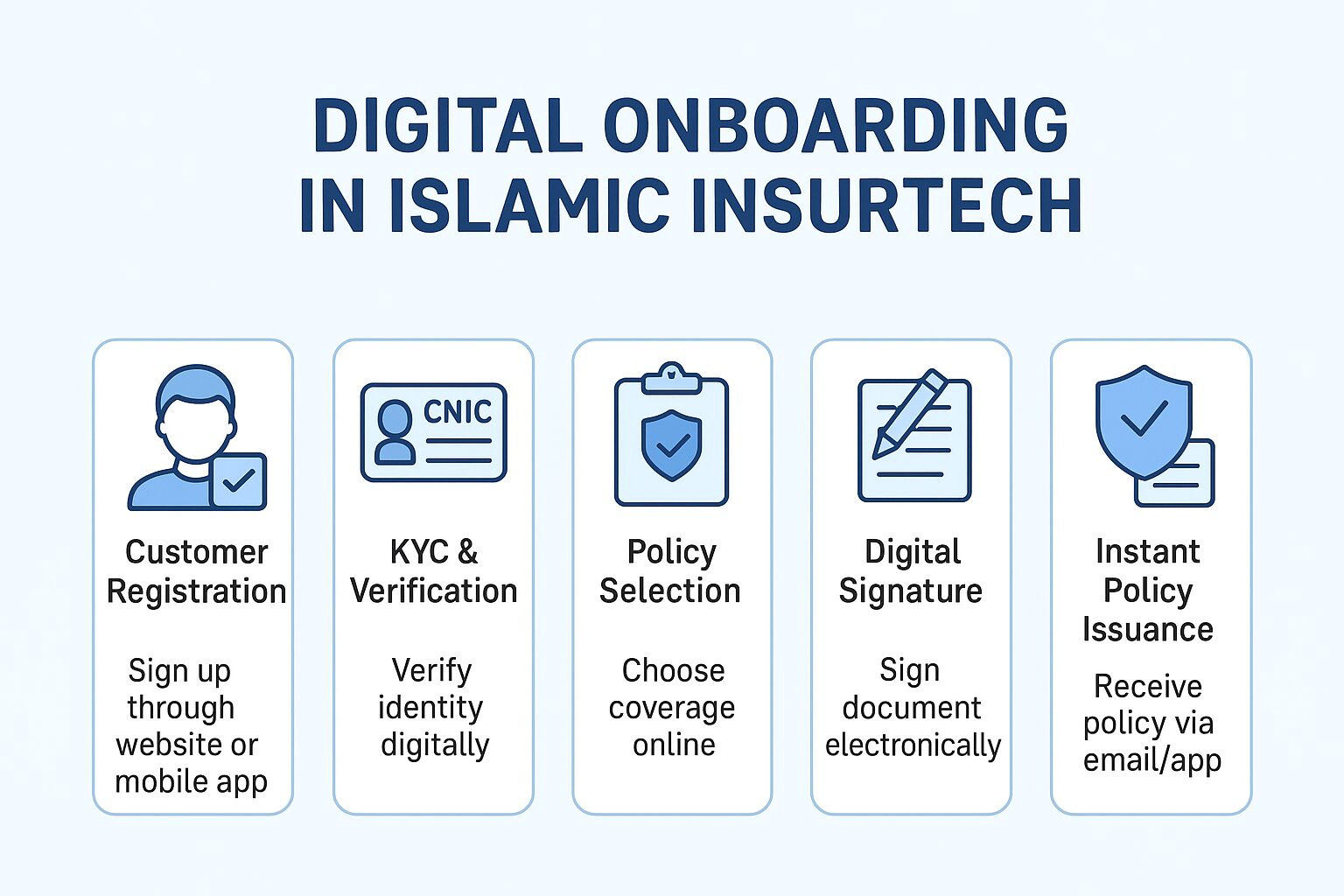Digitization Role in the Bangladesh Insurance Sector
Bangladesh’s undeveloped banking sector has great potential due to the rising smartphone and untapped population. FinTech will boost financial transparency, accountability, and dynamism in Bangladesh. Islamic Shari’ah finance in Bangladesh may use fintech (FinTech). All Bangladesh Islamic Bank operations will use Islamic FinTech.
Qualitative research examined FinTech adoption barriers. It has few Islamic finance FinTech companies (Islam, 2020). IBBL launched MCash mobile banking, while Al Arafah Islami Bank launched Islamic Wallet. IBBL (Islami Bank Bangladesh Limited) will build a FinTech platform to meet global standards (Islam, 2020).
Islamic FinTech will grow with Bangladesh’s young men, boosting the economy (Ahmad & Mamun, 2020). Since 2011, female account holders in Islamic finance nations and emerging countries like Ghana, Senegal, and India have increased dramatically. Islamic finance empowers women. Islamic money is less tech-savvy than traditional finance. Others haven’t used this feature to offer affordable financial services (Baber, 2019).
Bangladesh’s financial sector lags. It provides FinTech-based mobile financial services. In 2019, China and India led developing markets with 87 percent FinTech adoption, while the Netherlands, UK, and Ireland led developed nations with 73, 71, and 71 percent adoption, respectively. BRAC Bank Ltd, Dutch Bangla Bank Ltd, Nagad (Bangladesh Post Office), MCash (Islami Bank Ltd), Upay (United Commercial Bank Ltd), and others offer FinTech products and services. Bangladesh’s FinTech adoption drivers were studied (Nazrul et al., 2021).
Blockchain technology helps private banks handle virtual transactions. Streamlining processes, reducing duplication, increasing transparency and trust, eliminating ambiguities and inconsistencies, strengthening security, reducing paperwork, saving time and money, and providing real-time services are efficient. The study’s blockchain customers loved the service quality which boosted customer satisfaction (Saha, 2021).
Digitization creates domestic jobs and service sector innovation. The US, UK, and Australia outsource IT to Bangladesh to save money, which boosts its economy. Mobile money, peer-to-peer lending, and mobile insurance are examples of how FinTech is changing developing countries by providing affordable banking services to the unbanked. Wealthy Bangladeshis have made FinTech payments.
FinTech and financial inclusion for the unbanked is expanding (Jannatul & Nafizur, 2021). Low-cost FinTech services may increase financial inclusion (Khatun & Tamanna, 2020). ICT will aid the 17 SDGs by 2030. E-commerce and digital applications boost developing countries’ exports and encourage women’s entrepreneurship, job creation, and innovation through ICT-enabled financial services. Mobile phone use is rising, boosting economic growth and reducing poverty.
Bangladesh’s successful policy changes and the Prime Minister’s Office’s a2i strategy are promoting digital financial services. The Huawei Global Connectivity Index of 2019 placed Bangladesh fourth in digital economic growth and development. Mobile Financial Service (DFS) in Bangladesh (MFS). Dutch Bangla Mobile Banking and bKash created MFS. Sixty-seven million Bangladeshis receive MFS from 18 banks and NBFIs. DFS promotes rural technology and financial inclusion.
Bangladesh leads digital financial services. Mobile phones, e-wallets, ATMs, POS, and other DFS are helping the poor meet their financial needs. Twelve million middle-class Bangladeshis are expected to quadruple by 2025 as technology advances. Digital savings, credit, insurance, and investment services exist. Coronavirus has increased MFS use. Daily, 5.7 million MFS-bKash transactions show the country’s high digital transaction density. The fourth industrial revolution, which includes 5G networks, AI, IoT, and other innovations, boosts DFS potential (Harunur, 2020).
Bangladesh is the next big outsourcing destination for sales and marketing, software development, multimedia, clerical, and data entry work in the global freelance market (Fahmida et al., 2021).
IoT:
The Arduino Microcontroller-based system measures heart rate, body temperature, ambient temperature, humidity, and air quality. This study will improve asthma treatment anytime, anywhere (Nafisa et al., 2022). Sensors in IoT systems boost efficiency. The Bangladesh Telecommunication Regulatory Commission has legalized IoT in nine industries, including environment management, smart urban lighting, and smart parking. Local entrepreneurs offer farmers IoT-based advanced agricultural solutions like real-time cow sleep, heat cycle, and behavior monitoring. 2021).
Cloud Computing:
Oracle CloudWorld taught some Bangladeshi IT pioneers new technologies. Cloud computing may help Bangladesh close the digital divide if the government follows through (Ahsan, 2013). Cloud deployment, comparative performance, and system efficiency were positively correlated (Garrison et al., 2015).
Cloud computing can help SMEs increase revenue, profit margins, sales, ROI, ROA, and ROE, as well as market share, product or service quality, and corporate growth. Cloud computing studies support this (Khayer et al., 2021). FinTech reduces transaction cycle times and service quality costs. FinTech can boost Bangladesh’s financial sector and financial inclusion. FinTech-enabled payment systems improve tax collection and transparency. Bangladesh may automate loan approval confirmation with FinTech. Chatbots replace customers to save money and improve service.
FinTech:
After interviewing 310 people, a recent study on intellectual capital in FinTech services found that human capital development had the greatest impact on FinTech growth in Bangladesh. This is Bangladesh’s first study on FinTech in banking, and it could fill a crucial gap (Benazir et al., 2021). By providing technical assistance, resources, and regulatory solutions, such a partnership in Bangladesh could test and encourage acceptable innovation. Launching requires capacity building, technical manpower, and professional assistance (Ghalib, 2019).
Fifteen banks will serve 10 million daily transactions by 2021. P2P, inward remittance, salary, utility bill, merchant, and government payments have increased due to FinTech innovation (P2G). Bangladesh’s FinTech adoption is unstudied in developing economies (Jannat & Nafizur, 2021). MFS replaced cash in Bangladesh, increasing digital transactions. Few studies have examined mobile financial service uptake during the COVID-19 pandemic (Yan et al., 2021). Bangladeshi insurance companies should insure to promote product availability, accountability, and openness (ParthaPratim, 2022).
Blockchain Technology and Big Data:
Medical robots and blockchain technology can improve services for the Bangladesh Medical Association, Bangladesh Dental Society, and Bangladesh Nursing and Midwifery Council (Mahboob, 2021). Body sensors and gadgets may improve patient-expert communication. Big data analytics improves treatment. A case study links patients and doctors using a database, mobile app, and web app. The trial showed over 95% illness diagnosis accuracy using machine learning at 90% less cost than a local hospital in Bangladesh, supporting our platform’s use in rural areas (Samiul et al., 2019).
Business success in Bangladesh and other developing nations depends on big data. Big data can determine product demand. Dealing with massive amounts of data from various sources at different speeds and temporal orientations requires audience privacy. Big data can help Bangladeshi marketers create products that satisfy customers (Imrul & Rucsar, 2020). Bangladeshi FinTech companies could help create affordable consumer credit solutions like P2P lending, crowdfunding, and alternative credit scoring. ICT has boosted healthcare sector. Mobile phones, web apps, and smart medical devices help monitor patients remotely.
COVID-19:
COVID-19 has outstripped telemedicine healthcare demand, improving system efficiency (Monirujjaman, 2020). Doctors and medical staff can now receive patient information in real-time and treat patients regardless of location.







4 responses
Highly descriptivfe article, I enjoyed that bit.
Will there be a part 2? https://bandur-art.blogspot.com/2024/08/the-ultimate-guide-to-no-mans-sky-mods.html
Thank You. Albert for appreciating and encouraging me to write more. I will upload more articles on this topic.
Highly descriptive article, I enjoyed that bit. Will there be a part 2? https://bandur-art.blogspot.com/2024/08/the-ultimate-guide-to-no-mans-sky-mods.html
Remarkable! Its in fact remarkable article, I have got much clear idea concerning from this post.